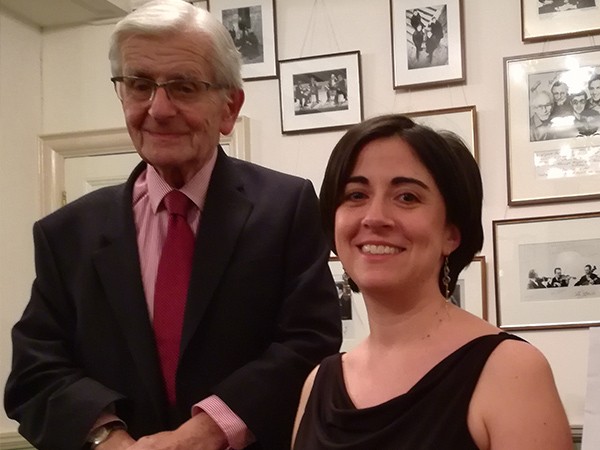
It was the perfect assignment for a lifelong music aficionado—compose a note for the London Symphony Orchestra about the famous German conductor who had been invited to perform. But Clive Marks just couldn't do it.
“I didn’t know how he acted during World War II,” Clive says. “Did he refuse to play the Nazi anthem? How did he feel when the Nazis fired the Jewish members of his orchestra?”
An orchestra official told him to just get over it, “It happened a long time ago!” But Clive couldn’t. This was in 1965.
But through his frustration came a revelation: studying the Holocaust through music could spark new interest among Jews inured to stories of death and destruction. “From then on, I knew the subject of music and the Holocaust was one I had to pursue,” he says.
His quest received a huge boost following a life-changing trip with Federation partner World ORT.
“You Realize We’ve Lost a Lot”
World ORT took Clive—a former chair of the London College of Music and London School of Jewish Studies, and a lecturer on music and the Third Reich for over 40 years—on what he calls “one of the most incredible experiences of my life”: a whirlwind tour of ORT’s cutting-edge Jewish day schools in ten countries around the world. “Tremendously impressed,” he realized World ORT’s global reach and emphasis on Jewish education made them the perfect partner to spearhead his unique approach within Holocaust studies.
Together with Dr. Shirli Gilbert—a history professor at the University of Southampton as well as a musician and a grandchild of survivors—he curates World ORT’s Music and the Holocaust website. It’s now the world’s largest archive of such materials, including information on hundreds of composers, places, and themes, plus hours of sound and video clips.
Now, anyone in the world can learn about Aleksander Kulisiewicz, who composed 54 songs over five years in the Sachsenhausen concentration camp; Herman Sachnowitz, a trumpeter in one of the six orchestras at Auschwitz; or any of the hundreds of other people who took the worst experience in human history and—willingly or not—turned it into art. “You listen to it and realize how much we’ve lost,” Clive says.
No matter how much one learns about the Holocaust, listening to it is of vital importance to any Jew and lover of 20th century music. “People are moved by the rawness of the early recordings, and the voices of the young survivors freshly liberated from the camps. It opens their minds to a different perspective on the Holocaust,” Shirli says.
The Universal Language
Their dedication is paying off. On International Holocaust Remembrance Day, BBC 3 Radio aired a major London concert of music from the Holocaust to great success. “The radio concerts have generated a huge amount of publicity and interest,” says Shirli. “Most people were not aware of this.”
It’s also prompted the creation of 20 fellowships for post-graduate students to explore new avenues such as the role of Sephardic music in the Holocaust and the effect it had on sacred music.
“People ask me, ‘Why do you want to be involved with this tragic music all day?’ but I find it inspiring that it was composed against such long odds,” Clive says. “You can’t describe the hunger or the cold or how it feels to know you’ll never see your loved ones again. But when you hear the music, you begin to realize the savagery of what happened. World ORT’s work explains that the Holocaust is deeper and more far-reaching than anyone could imagine.”

0Comments
Add CommentPlease login to leave a comment